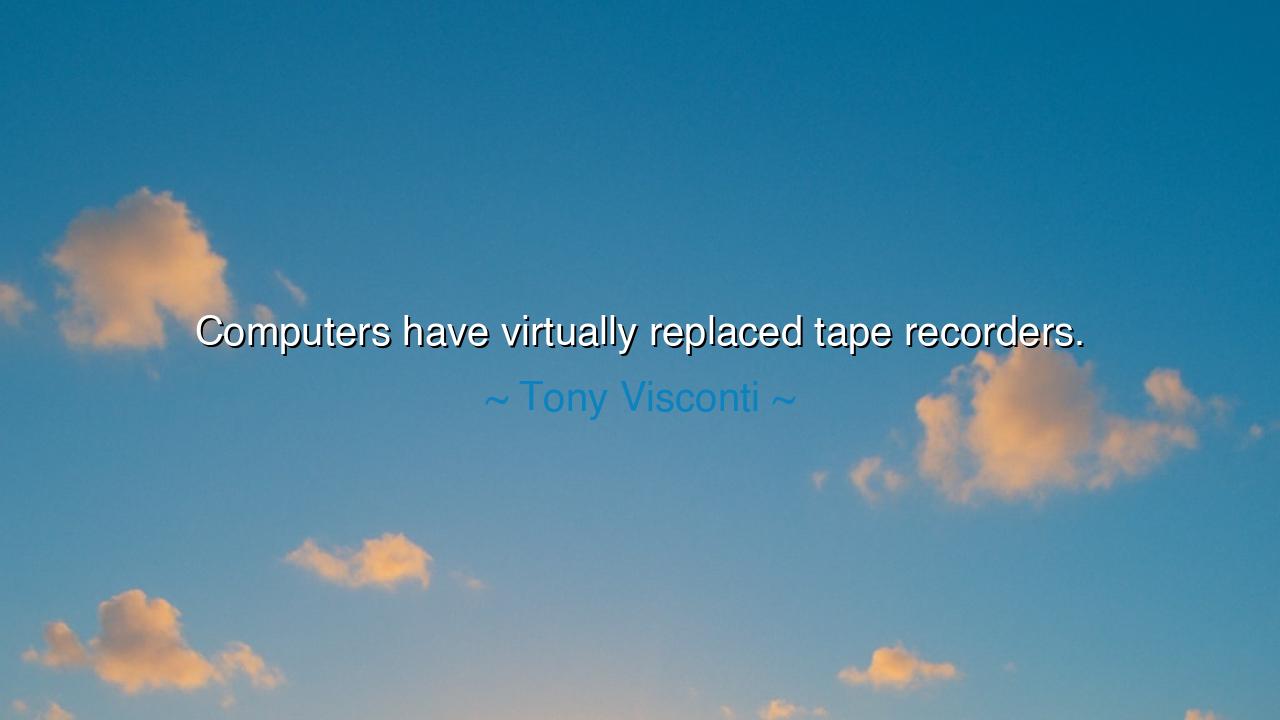
Computers have virtually replaced tape recorders.






"Computers have virtually replaced tape recorders." – Tony Visconti
In the unfolding journey of progress, the tools that once shaped the very fabric of human life can sometimes become obsolete, swept aside by the relentless tide of advancement. Tony Visconti speaks to this phenomenon with his observation that computers, once distant and foreign to our daily lives, have now become so integrated into our existence that even tape recorders, once the epitome of recording technology, have been nearly displaced. In this simple statement, Visconti captures the essence of change in the modern world, a reminder that technology moves in waves, and the tools we use are often ephemeral, replaced by those that are faster, more efficient, and more aligned with the needs of the time.
In the ancient world, change was often slow, and technology was a precious commodity. The great philosophers of ancient Greece—Socrates, Plato, and Aristotle—did not have the luxury of fast, ever-changing technology, but they understood the importance of the tools at hand. The written word itself, developed by the Sumerians and later perfected by the Egyptians, was a revolutionary technology, a means to record and transmit knowledge. But in their time, even the scroll or tablet was a precious artifact, carefully preserved for generations. The rapid advancement of today’s technology—embodied by computers—has made the once-revolutionary tape recorder look as distant as the scrolls of the ancients, reminding us that all things, no matter how important they seem in the moment, are subject to the whims of time.
Think of the printing press, another invention that revolutionized communication in the Renaissance. Prior to its invention, the copying of manuscripts was a laborious task carried out by hand. With the advent of the printing press, the speed at which knowledge could be reproduced and spread transformed society. Just as the printing press rendered the laborious task of hand-copying texts obsolete, the computer has now made tape recorders—tools once indispensable to musicians, journalists, and everyday people—a thing of the past. The ease with which we can now capture, edit, and store sound through digital technology echoes the profound impact of earlier inventions. Visconti’s remark draws our attention to the speed of this evolution—where once we relied on clunky, mechanical devices, now we wield computers capable of storing and processing information in ways unimaginable just a generation ago.
Consider the rise of photography in the 19th century, another example of technology disrupting the past. Daguerre’s invention of the photographic process allowed images to be captured and shared in ways that paintings and drawings never could. At first, photography was a complex process, involving heavy equipment and detailed processes, but over time, it became more accessible, eventually evolving into the digital cameras of today. Just as Daguerre’s invention displaced the old methods of creating visual representations, so too did the advent of computers replace tape recorders. The world moves forward, and in doing so, it leaves behind the tools of yesteryear, replacing them with faster, more efficient, and less cumbersome alternatives.
We see this principle echoed in the story of the steam engine, which fueled the Industrial Revolution. Before steam power, factories relied on water mills and human labor to run machinery. The introduction of steam power, however, unlocked the potential for vast production, fueling economic growth and industrialization on a scale never before seen. Computers, like the steam engine, have redefined the way we work, learn, and create. The tape recorder, once a marvel of its time, has become obsolete, just as water mills and hand-powered machines were replaced by more efficient, automated systems. This progression reminds us of the impermanence of technology and the relentless march of innovation.
The lesson of Visconti’s words is one of adaptation. Just as ancient civilizations had to adapt to new forms of communication, whether through the spoken word, writing, or the printed page, so too must we embrace the tools of our time. The tape recorder, for all its importance in its era, is now merely a relic of the past. In the same vein, the computers we use today will one day be surpassed by technologies we cannot yet imagine. We must not cling to the tools of yesterday, but instead, remain open to the next wave of innovation, ready to adapt and use the tools that will serve the needs of future generations.
As we move forward, let us remember that progress is not just about new gadgets and inventions—it is about the adaptability of the human spirit. Whether it is language, tools, or ideas, the journey of human development is one of continuous evolution. The lesson of Visconti is clear: as the world changes, so too must we change, leaving behind what no longer serves us and embracing what lies ahead. The tape recorder, once a key to capturing the sounds of the world, has given way to the computer, a tool capable of much more. But the essence of creation—whether through sound, image, or thought—remains ever constant, shaped by the tools we use, and by the endless creativity of the human spirit.






AAdministratorAdministrator
Welcome, honored guests. Please leave a comment, we will respond soon